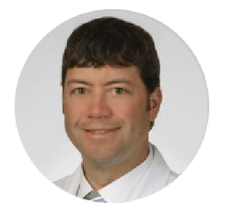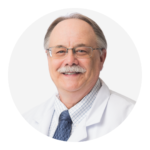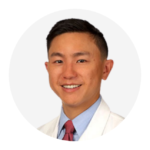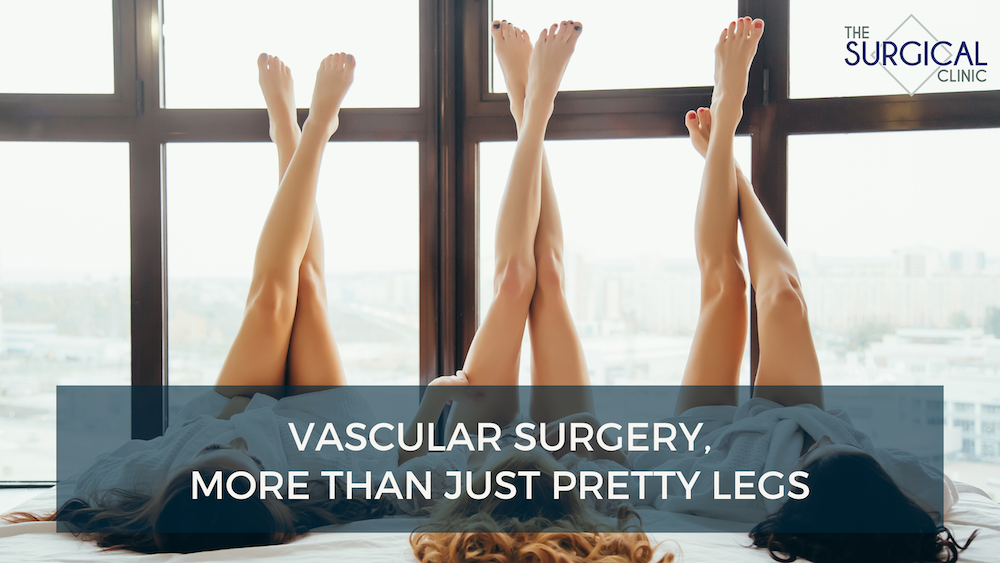By The Surgical Clinic
The TV is full of ads for people wanting younger looking legs – and Vascular Surgery by a skilled Vascular Surgeon can accomplish that. But at The Surgical Clinic, Vascular Surgeons are more than vein guys or vein doctors. The specialists at The Surgical Clinic are Board Certified Surgeons whose focus is on veins with an eye to the cosmetic, but also on the reality of what can happen when vascular disease is left untreated.
The Vein Centre of The Surgical Clinic has established two nationally accredited Vascular Laboratories for its patients where ultrasounds and other tests are conducted. The staff of these laboratories all have earned national accreditation in the special testing that is needed for Vascular patients.
Many of the surgical procedures are completed in The Surgical Clinic’s state-of-the-art Vascular Procedure Centre. The Vascular Procedure Centre was established to provide an intimate and low-stress environment for patients to have vein surgeries, recover and go home the same day.
Types of Vascular Diseases:
- Abdominal Aortic Aneurysm
- Atherosclerosis
- Carotid Artery Disease/Carotid Artery Stenosis
- Chronic Venous Insufficiency
- Intermittent Claudication
- Deep Vein Thrombosis
- Peripheral Vascular Disease
- Pulmonary Embolism
- Raynaud’s Phenomenon
- Renal Vascular Disease
- Thoracic Aortic Aneurysm
- Varicose Veins
Related: Peripheral Arterial Disease: Don’t Ignore It
In treating vascular disease, it is important to remember that there are more than cosmetic results at stake. The arteries, the large tubes that carry blood away from the heart, and the veins, that carry blood back to the heart, have to withstand a lot of pressure from the pumping action of the heart. In fact, a single droplet of blood makes a complete tour around your body in about 1 minute.
Arteries and veins have to be elastic for the moments when pressure might build-up, but it becomes dangerous when those tubes start to lose their elasticity and become saggy. When this happens, blood will often pool in low areas (e.g. the legs) and cause pain and swelling. When blood isn’t circulating properly, your body is also not getting the right amount of oxygen in all places and the blood isn’t carrying away the waste from your body. That can lead to other problems associated with stroke, heart disease, kidney problems, etc.
What Causes Vascular Disease?
- Genetics
- Infection
- Embolus/thrombus: A blood vessel may be blocked by an embolus (a tiny mass of debris that moves through the bloodstream) or a thrombus (a blood clot).
- Inflammation: In general, inflammation of blood vessels is referred to as vasculitis, which includes a range of disorders. Inflammation may lead to narrowing and/or blockage of blood vessels.
- Injury
- Medicines
- Hormones
- Heart disease
Who is at risk for developing vascular diseases?
The risk factors for vascular diseases can vary, but here are some of the most common risk factors:
- Age
- Diabetes or high cholesterol
- Family history
- Infection or injury that damages your veins
- Lack of exercise
- Obesity
- Pregnancy
- Sitting or standing still for long periods of time
- Smoking
How Can You Take Care of your Veins and Arteries
Eat Well
Food plays a massive role in your health and the health of your veins and arteries is no exception. When it comes to eating well, color is important. To get a delicious nutrient boost with heart-healthy bioflavonoids, eat a rainbow of fruits and vegetables. Bioflavonoids are phytonutrients that give many fruits and vegetables their vibrant colors; in general, the brighter the food, the more bioflavonoids it contains.
Rutin, a form of bioflavonoid, has long been used to aid digestion and circulation. Citrus fruits and apples are also rich in rutin and make excellent choices. In addition, leafy greens help to maintain a balanced circulatory system. They aid in the formation of red blood cells, which transport oxygen across the body. Greens, such as spinach, are high in omega-3 fatty acids, which aid in the formation of solid veins. They’re also potent antioxidants that can protect your body from free radical harm. Also, watch your sodium intake!
Drink Well
Water is an essential ingredient in every lifestyle. Your plasma contains about 93 percent water and makes up about half of our total blood volume. Drinking at least 8 glasses of water a day will prevent your body from having to work extra hard to keep you in top shape.
Exercise Well
Finally, as important as eating a healthy diet rich in fruits and vegetables is, proper exercise is also essential to encourage blood flow, which delivers oxygen and nutrients to your heart and body. Walking is the safest way to encourage good circulation. This easy exercise will also help you avoid varicose and spider veins. Walking helps blood flow by strengthening the calf pump. Walking is a simple way to integrate exercise into your daily routine, and it is particularly necessary if you work at a desk job and spend the majority of your time sitting. Other low-impact exercise options include riding a bike or using the elliptical, swimming, or even yoga.
Strong arteries and veins are important for preventing a number of circulatory problems. Both of these factors working together would result in a healthy circulatory system as well as a happier body and mind, allowing you to live the life you deserve. Talk to The Surgical Clinics doctors for more information on vein disease symptoms and how to manage them.
The other dangerous issue with veins that are not elastic enough is that an aneurysm can develop. Think of this like a balloon that develops a weak spot. The pressure in the balloon on that weakened place can eventually cause the balloon to bulge and then pop. That same thing can happen in arteries and veins.
In all these cases the fix is surgery. It’s not just about getting rid of spider veins and varicose veins, it really is about a healthy you! It’s about being able to stand and walk without pain and swelling. And it’s about preventing serious problems like strokes. To learn more visit the Vascular Surgery portion of the website. You can also see new videos as they are released by subscribing to ou YouTube Channel. Read about the best time to schedule a vascular procedure in Tennessee.
Vascular Surgeons in Nashville and Middle Tennessee

Dr. Julia Boll
Vascular Surgeon
VIEW PROFILE

Dr. Jeffery B. Dattilo
Vascular Surgeon
VIEW PROFILE

Dr. JimBob Faulk
Vascular Surgeon
VIEW PROFILE

Dr. Bryan T. Fisher
Vascular Surgeon
VIEW PROFILE

Dr. Brian Kendrick
Vascular Surgeon
VIEW PROFILE

Dr. Billy J. Kim
Vascular Surgeon
VIEW PROFILE

Dr. Allen Lee
Vascular Surgeon
VIEW PROFILE

Dr. Caroline Nally
Vascular Surgeon
VIEW PROFILE

Dr. Adam Richter
Vascular Surgeon
VIEW PROFILE

Dr. Mark Shelton
Vascular Surgeon
VIEW PROFILE

Dr. Todd H. Wilkens
Vascular Surgery
VIEW PROFILE

Dr. Patrick Yu
Vascular Surgeon
VIEW PROFILE

